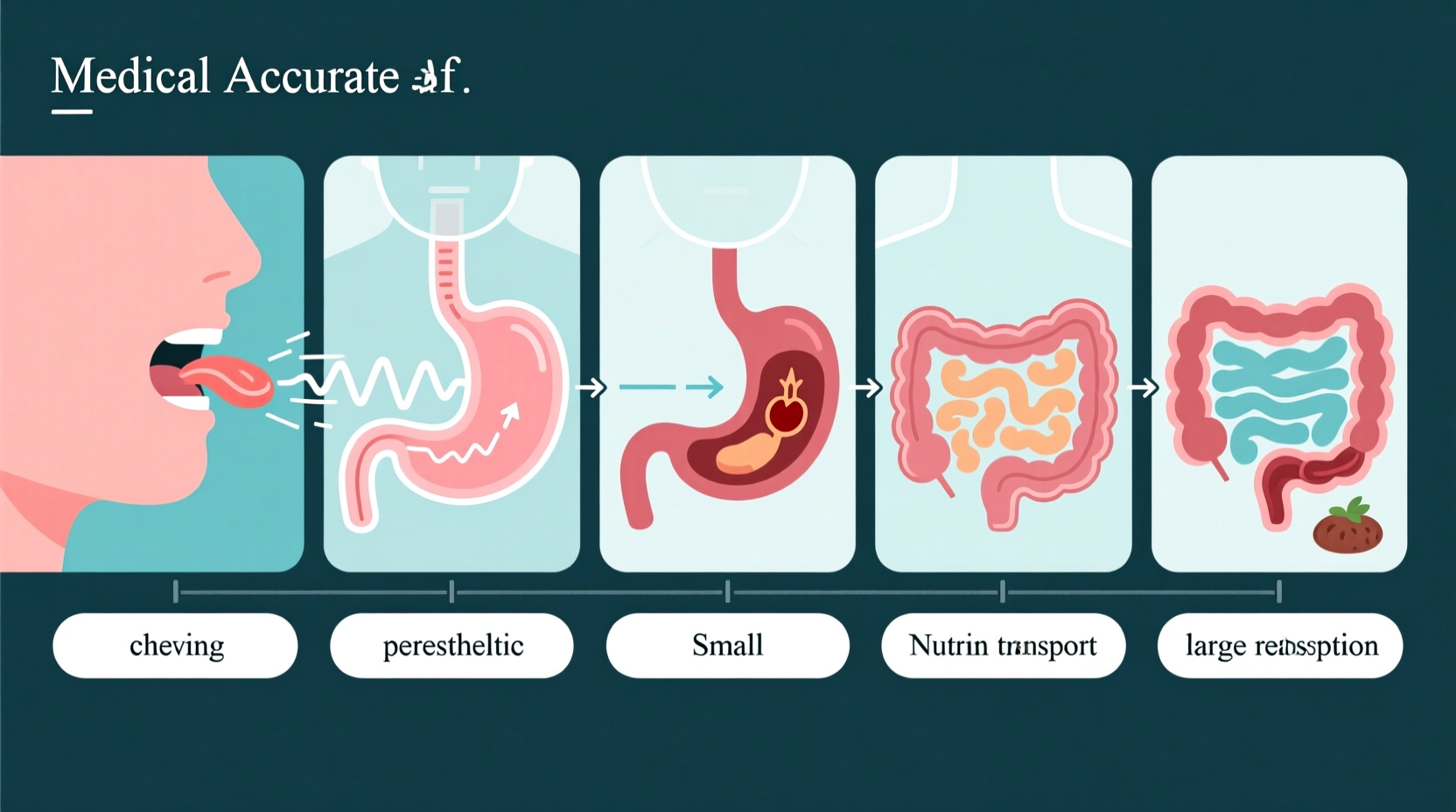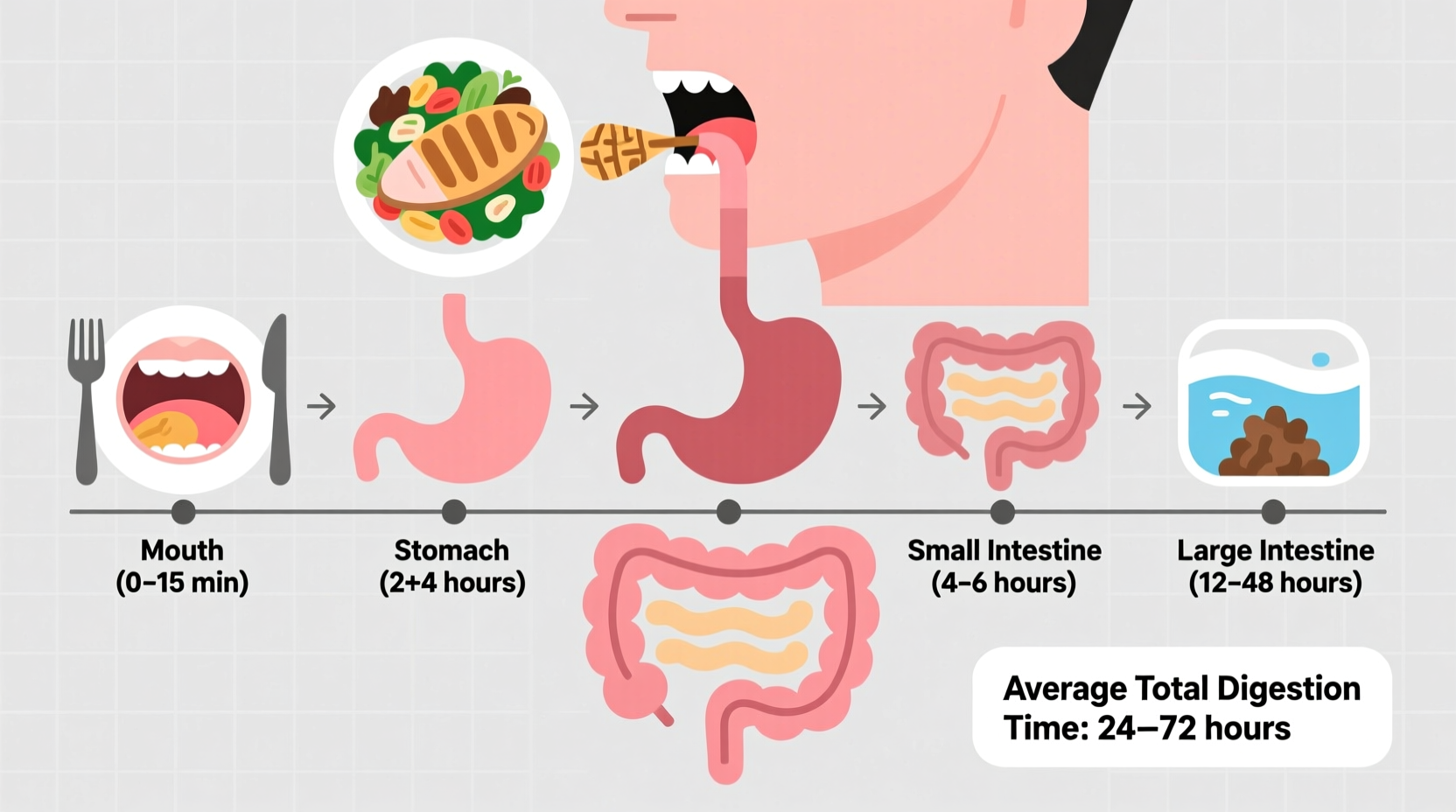Most food takes 24-72 hours to fully digest, but specific components move through your system at different rates. Liquids pass through your stomach in 20-40 minutes, while high-protein and high-fat meals can take 3-5 hours just to leave your stomach. Carbohydrates generally digest fastest (2-3 hours), proteins take longer (3-4 hours), and fats slow the process further (up to 6 hours in the stomach).
Ever wonder why you still feel full hours after eating, or why certain foods seem to linger longer in your system? Understanding digestion timing isn't just curiosity—it directly impacts how you feel throughout your day, your energy levels, and even your sleep quality. Let's break down exactly what happens after your last bite and when you can expect complete digestion.
The Digestion Timeline: What Happens Hour by Hour
Your digestive system works like a carefully choreographed assembly line, with each stage having its own timeline. When you swallow food, it begins a journey that typically spans 1-3 days, but the pace varies dramatically depending on what you've eaten and your individual physiology.
| Digestive Stage | Typical Duration | What's Happening |
|---|---|---|
| Mouth | 30-60 seconds | Saliva breaks down carbohydrates; mechanical chewing prepares food for swallowing |
| Esophagus | 2-10 seconds | Food travels to stomach via peristalsis (muscle contractions) |
| Stomach | 2-5 hours | Acids and enzymes break food into chyme; proteins begin digestion |
| Small Intestine | 2-6 hours | Nutrient absorption occurs; fats and carbohydrates fully digested |
| Large Intestine | 10-59 hours | Water absorption; formation of stool; gut bacteria process remaining material |
This timeline comes from research published by the National Institute of Diabetes and Digestive and Kidney Diseases, which tracks digestion using imaging techniques and marker studies. The complete digestive process from mouth to elimination averages 24-72 hours for most healthy adults, but numerous factors can accelerate or delay this process.

How Different Foods Affect Digestion Speed
Not all foods digest at the same pace. Your meal composition significantly impacts how quickly you'll feel hungry again and how your body processes nutrients. Understanding these differences helps explain why that salad might leave you hungry sooner than a grilled chicken dinner.
Carbohydrates generally move through your system fastest. Simple carbs like white bread and sugary snacks can leave your stomach in 1-2 hours, while complex carbohydrates like whole grains take 2-3 hours. According to Harvard Medical School research, fiber-rich carbohydrates actually slow digestion slightly but provide more sustained energy release.
Proteins require more work to break down. A chicken breast or fish fillet typically spends 3-4 hours in your stomach as gastric juices break peptide bonds. The Mayo Clinic notes that protein digestion continues for several hours in the small intestine as enzymes further break down amino acids.
Fats are the slowest to digest. That creamy avocado toast or salmon dinner can keep your stomach working for 4-6 hours. Fats trigger the release of cholecystokinin (CCK), a hormone that slows gastric emptying—this is why high-fat meals make you feel full longer but can also cause discomfort if eaten in excess.
Personal Factors That Change Your Digestion Timeline
Your individual digestion speed isn't just about what you eat—it's influenced by several personal factors that explain why your friend might feel hungry hours before you after the same meal.
Age matters significantly. According to the American Gastroenterological Association, gastric emptying slows by about 1% per year after age 30. This means a 50-year-old might experience 20% slower digestion than when they were 30, affecting how quickly they feel hungry again.
Your gut microbiome composition plays a crucial role. People with diverse, healthy gut bacteria can process certain fibers and complex carbohydrates more efficiently. Research from the NIH shows individuals with higher levels of Bacteroides species digest plant fibers up to 30% faster than those with lower levels.
Hydration status directly impacts digestion speed. Dehydration slows peristalsis (the muscle contractions moving food through your system), potentially adding hours to your digestion timeline. The National Academies of Sciences, Engineering, and Medicine recommends 2.7-3.7 liters of daily fluid intake depending on gender and activity level for optimal digestive function.
Warning Signs Your Digestion Timeline Is Off Track
While digestion times vary, certain symptoms indicate your system might be working too fast or too slow. Recognizing these signs helps determine when to seek professional advice rather than just waiting it out.
If you consistently experience stomach pain or bloating within 30 minutes of eating, this could indicate gastroparesis (delayed stomach emptying) or food intolerances. Conversely, diarrhea within 1-2 hours of eating suggests rapid transit that prevents proper nutrient absorption.
Pay attention to your bowel movement timing. The Bristol Stool Scale, widely used by gastroenterologists, helps assess digestive health. Type 3-4 stools passed 12-48 hours after eating generally indicate healthy digestion, while consistently loose stools (Types 5-7) within 6 hours or hard stools (Types 1-2) taking more than 72 hours to appear warrant medical evaluation.
Practical Tips to Support Healthy Digestion Timing
You don't have to accept uncomfortable digestion patterns as inevitable. Small, evidence-based adjustments can help optimize your digestive timeline without drastic dietary changes.
Chew thoroughly—aim for 20-30 chews per bite. This simple practice reduces the workload on your stomach by beginning carbohydrate digestion in your mouth through salivary amylase. Studies show thorough chewing can decrease stomach processing time by up to 25% for starchy foods.
Time your fluids strategically. Drink water 30 minutes before meals rather than during eating. Consuming liquids with meals dilutes stomach acid, potentially slowing protein digestion by 15-20% according to research published in the Journal of Neurogastroenterology and Motility.
Consider food sequencing. Start meals with vegetables, followed by protein, then carbohydrates. This order leverages how different nutrients affect gastric emptying—fiber-rich vegetables prepare your system, proteins slow digestion appropriately, and carbs finish the process without overwhelming your system.
When to Consult a Healthcare Professional
While occasional digestive variations are normal, persistent changes warrant medical attention. Consult a healthcare provider if you experience:
- Consistent stomach pain lasting more than 2 hours after eating
- Unexplained changes in bowel habits lasting over 2 weeks
- Food consistently passing through your system in less than 12 hours or more than 72 hours
- Nighttime symptoms that disrupt sleep
These could indicate conditions like irritable bowel syndrome, gastroparesis, or inflammatory bowel disease that require professional diagnosis and treatment. Don't rely solely on digestion timelines to assess your health—your overall pattern and accompanying symptoms provide the most valuable clues.











 浙公网安备
33010002000092号
浙公网安备
33010002000092号 浙B2-20120091-4
浙B2-20120091-4